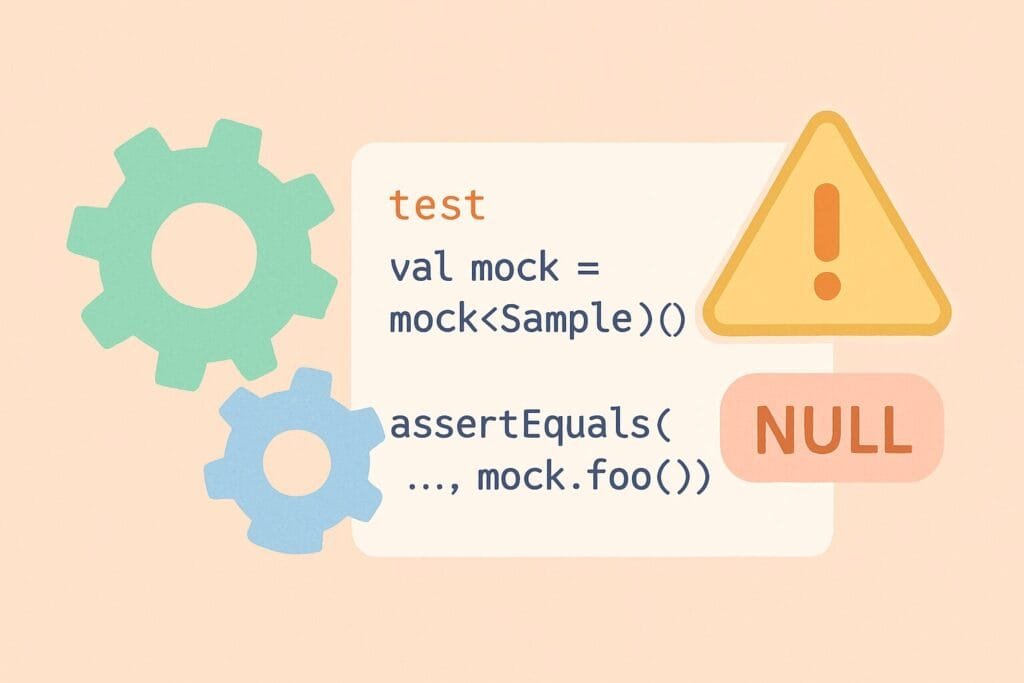Running unit tests with Mockito in Kotlin can sometimes lead to an annoying and confusing issue: Null returned from a Mockito mock. This problem usually happens when using Kotlin’s null-safety features with Java-based mocking libraries like Mockito. In this article, we’ll walk through what causes this error and provide a working solution with full example code using Enlighter for code formatting.

Understanding the Issue
The error message:
org.mockito.exceptions.misusing.NullInsteadOfMockException: Returned null instead of a mock
This typically means Mockito couldn’t inject the dependency because the field or method you’re trying to mock is null. Since Kotlin is strict about nullability, this creates a disconnect with Mockito, which defaults to returning null when not instructed otherwise.
Common Causes of the Error
- Incorrect use of annotations like
@Mock,@InjectMocks - Mockito not initialized properly with
MockitoAnnotations.openMocks(this) - Trying to inject a mock into a Kotlin
valinstead ofvar - Mockito not compatible with Kotlin null-safety without help from plugins like
mockito-kotlin
Solution: Using Mockito Properly in Kotlin
Let’s look at how to set up a working example of Mockito test in Kotlin and avoid the “null returned” issue.
Step 1: Add Dependencies
dependencies {
testImplementation 'org.mockito:mockito-core:5.12.0'
testImplementation 'org.mockito.kotlin:mockito-kotlin:5.2.1'
testImplementation 'junit:junit:4.13.2'
}
The key here is the use of mockito-kotlin which provides Kotlin-friendly extensions and avoids null problems.
Step 2: The Code to Test
class UserRepository(private val apiService: ApiService) {
fun getUserName(userId: String): String {
val user = apiService.getUser(userId)
return user.name
}
}
data class User(val id: String, val name: String)
interface ApiService {
fun getUser(userId: String): User
}
Step 3: Writing the Unit Test with Mockito
class UserRepositoryTest {
private lateinit var apiService: ApiService
private lateinit var userRepository: UserRepository
@Before
fun setup() {
apiService = mock()
userRepository = UserRepository(apiService)
}
@Test
fun `should return user name`() {
val dummyUser = User("1", "John Doe")
whenever(apiService.getUser("1")).thenReturn(dummyUser)
val result = userRepository.getUserName("1")
assertEquals("John Doe", result)
}
}
Important Notes
- Always use
mockito-kotlin’smock()andwhenever()to avoid null-return issues. - Don’t use
valwith@Mockin Kotlin, usevaror initialize insidesetup().
Alternative with Annotations (Not Recommended in Kotlin)
While possible, annotation-based mock initialization is discouraged in Kotlin due to its strict final and null-safety constraints.
@RunWith(MockitoJUnitRunner::class)
class UserRepositoryTest {
@Mock
lateinit var apiService: ApiService
@InjectMocks
lateinit var userRepository: UserRepository
@Test
fun `should return user name`() {
val dummyUser = User("1", "John Doe")
whenever(apiService.getUser("1")).thenReturn(dummyUser)
val result = userRepository.getUserName("1")
assertEquals("John Doe", result)
}
}
Even though the above might work, it may break in future Kotlin versions due to final classes and constructor requirements.
Conclusion
Mockito was built for Java, and while it can be used with Kotlin, you have to be aware of the differences in language behavior. The “Null returned from a mock” error is common, but by using mockito-kotlin and proper test setup, this issue can be avoided entirely. Always test with late initialization, prefer mock() over annotations, and use whenever() from the mockito-kotlin library to ensure your mocks behave correctly.
More Resources
For advanced users, visit Mockito-Kotlin GitHub repository for documentation and usage patterns.

